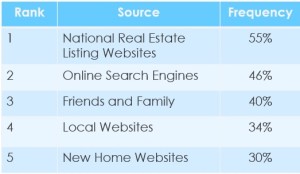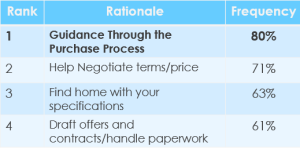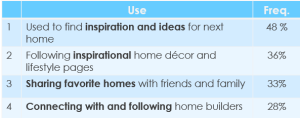 By Megan Vestal, BDX
By Megan Vestal, BDX
The Millennial Generation is typically defined as anyone who was born after 1980, or anyone who reached young adulthood around 2000 – after development of the World Wide Web. This generation’s defining characteristic is the influence technology has had on shaping their lives. This generation represented one-third of the U.S population in 2013, and it represents about 45% of our panel. With all of the hype, hipsters, and technological development surrounding Millennials, we wanted to know if and how the way Millennials approach home shopping differs from previous generations. To shed light on this issue we filtered data from five surveys we’ve fielded to our Home Shopper Insights Panel, and pulled out the most interesting insights.
How do Millennials Shop for Homes?
 The easy answer is online. National Real Estate Websites and Online Search Engines rank #1 and #2 respectively when asked “Which sources do you use in your search for a home.” This may seem obvious, but the frequency of Online Search Engines, at 46%, makes a strong case for new home builders to invest in SEO type solutions to maximize their presence on the web. Especially if their development area is appealing to Millennial home shoppers. Other generations also share Millennials top two rankings, however their following ranks are: Local Real Estate Listing Websites – 45%, Model Home Visits – 38%, and Builder Websites – 37%. Millennials are in fact 16% less likely to visit a builder website compared to other generations, and prioritize the opinions of their friends and family to a much higher degree than other generations.
The easy answer is online. National Real Estate Websites and Online Search Engines rank #1 and #2 respectively when asked “Which sources do you use in your search for a home.” This may seem obvious, but the frequency of Online Search Engines, at 46%, makes a strong case for new home builders to invest in SEO type solutions to maximize their presence on the web. Especially if their development area is appealing to Millennial home shoppers. Other generations also share Millennials top two rankings, however their following ranks are: Local Real Estate Listing Websites – 45%, Model Home Visits – 38%, and Builder Websites – 37%. Millennials are in fact 16% less likely to visit a builder website compared to other generations, and prioritize the opinions of their friends and family to a much higher degree than other generations.
When asked where they recalled hearing information about homes & real estate, Millennial’s top answers were: Friends and Family – 45%, Roadside Signs – 41%, and Online Advertisements – 39%.
Other generations cited: Online Advertisements – 44%, Roadside signs – 43%, Realtor Advertisements – 37%, Realtors – 36%, and finally Friends and Family – 33%. Overall Millennials appear 11% more likely to recall information about homes from friends and family members than other generations. Other generations are 9% more likely to pull information from Real Estate/ New Home Publications. Though the internet is certainly the first  information stop for the home buying Millennial, they appear to recall more traditional forms of advertisement before citing online sources.
information stop for the home buying Millennial, they appear to recall more traditional forms of advertisement before citing online sources.
Social media is a huge piece of the millennial lifestyle. 80% of our panel millennials reported spending over ½ hour of their time on Social Media every day. This is 10% more viewers than other generations. For millennials, 75% of that time is spent on Facebook, 8% on Twitter, and 5% on Instagram. But does this dedicated time spent consuming peers’ cat pictures and reading click-bait journalism also include home shopping? We discovered the answer is yes, millennials are 20% more likely to find social media sites useful to their home shopping process.
 Other generations use social media as a more practical tool. In terms of home shopping, they use social media to connect and follow realtors, homebuilders, and other industry partners. The focus is on connecting with members of the home shopping process, not first and foremost on the ideal home itself. However, more than a third of these panelists cite that they do not use social media at all in their process.
Other generations use social media as a more practical tool. In terms of home shopping, they use social media to connect and follow realtors, homebuilders, and other industry partners. The focus is on connecting with members of the home shopping process, not first and foremost on the ideal home itself. However, more than a third of these panelists cite that they do not use social media at all in their process.
Although Facebook and Twitter take first place for general social media use, panelists report that Facebook (56%) and Pinterest (16%) are the most frequently used social media sites in their home shopping process. Surprisingly Instagram is absent from the home shopping social media list for millennials. Because of the quality of images produced by the realty and home building industries, Instagram may provide a new effective platform for generating brand interest and awareness in millennials.
What do Millennials Value in a Home?
When seeking out a new home location, Millennials ranked these as their top five most important factors when assessing location quality:
- Proximity to everyday conveniences
- Public School Performance
- Proximity to Major Highways
- Proximity to work or major employment
- Presence of Similar People
Price and location aside, the top five important factors for home shopping Millennials were:
- Floor Plan/ Layout
- Financing Options
- Durability and Quality of Materials
- School Quality
- Standard Features or Upgrades Available
How are Millennial Home Shoppers Different than Other Generations?
Prioritization of the Social Network
This concept does not just apply to social media, although social media does play a key role today in the maintenance of a social network. Looking back at the data on home shopping, Millennials value the information, input, and opinions of their friends and family more than other generations. In fact, Millennials reported recalling home information from friends and family more than other generations reported recalling information from online advertisements (their top reported source). The U.S Council of Economic Advisers reports millennials’ “community-mindedness also includes a strong connection to family. Millennials have close relationships with their parents, and as high school students, roughly half say that it is important to them to live close to their friends and family, compared with 29% of baby boomers and 40% of Generation Xers.” Social media plays a key role in creating this sense of community over long distances. Millennials are 13% more likely to share social media ideas with their friends and family. So what does this mean for home builders and realtors? A focus on creating network building and community centric home communities, and homes that allow for family spaces would be key points to emphasize to Millennial home shoppers. Posting social content that is ‘shareable’ and ‘inspiring’ could also get more millennials talking about your brand. Through community focused initiatives (perhaps hosting a back to school event for families, or a networking event at a model home) home builders could establish a positive relationship with key community leaders, generating more word of mouth buzz around their brand.
Confidence in Product, not Process
With the tools of the internet at their fingertips, on their laps, and in their pockets Millennials have grown up in a world with unlimited product choices, and nearly unlimited ability to access those choices and research the ideal product for them. Millennials are also 14% more likely to need guidance through the home shopping process than previous generations. Although they can find the attributes, traits, and customizable features for their dream home, and these features can bring Millennial buyers into communities, it is the guidance, patience, and confidence that new home sales teams and realtors can demonstrate in the process that will ultimately seal the deal.
For a great reference about the economy and Millennials, check out 15 Economic Facts About Millennials by The Council of Economic Advisers, Oct. 2014.
For more information on the Home Shopper Research Panel, contact info@thebdx.com, call 866-651-8866, or check out the panel website here.

